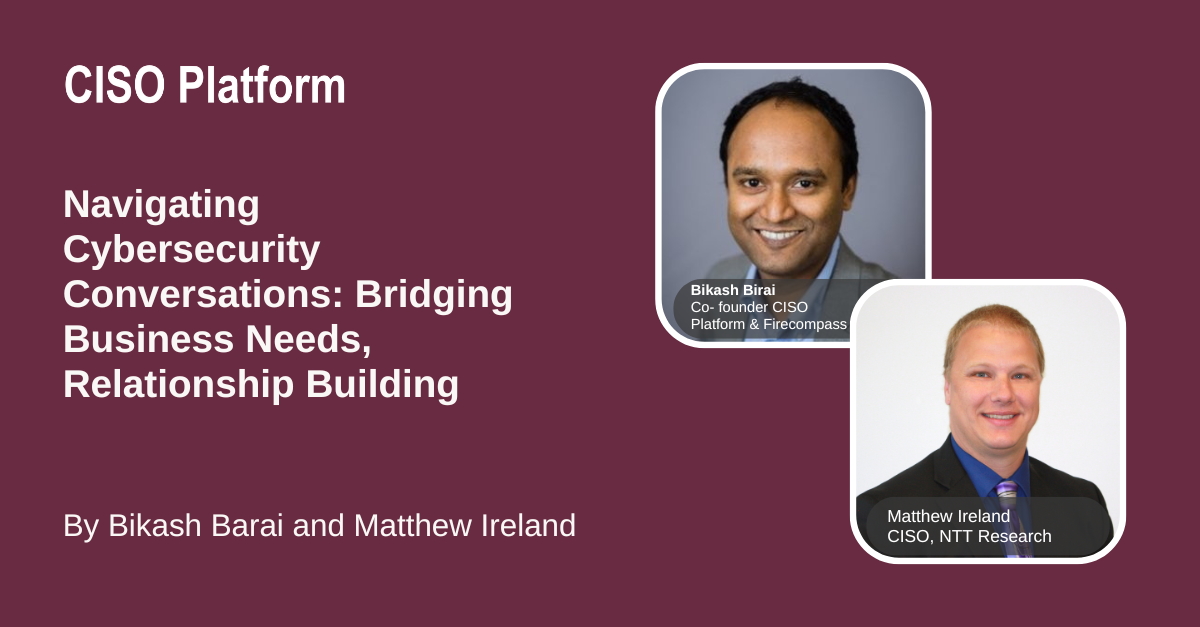In the complex world of cybersecurity, bridging the gap between technical experts and business stakeholders is paramount for effective communication and collaboration. However, business leaders often find themselves lost in a sea of acronyms and technical jargon, making it challenging to grasp the importance of cybersecurity initiatives. This discussion explores strategies for aligning cybersecurity language with business priorities, emphasizing the need for relationship-building and insightful questioning to uncover valuable insights.
Here is the verbatim discusssion:
Highlights :
Aligning Language with Business Priorities: Business stakeholders are often disengaged by technical jargon and acronyms commonly used in cybersecurity discussions. To effectively communicate with them, cybersecurity professionals must translate complex concepts into language that resonates with business objectives and concerns.
Building Relationships: Establishing strong relationships with business stakeholders is essential for fostering collaboration and trust. By taking a relational approach akin to a psychotherapist, cybersecurity professionals can create a conducive environment for open dialogue and information sharing.
Asking Insightful Questions: Rather than bombarding stakeholders with technical inquiries, adopting a thoughtful, investigative approach can yield valuable insights. By asking targeted questions in a relationship-driven manner, cybersecurity professionals can uncover the intricacies of business operations and data handling practices.
In the realm of cybersecurity communication, success lies in the ability to bridge the gap between technical expertise and business priorities. By aligning language with business objectives, building relationships, and asking insightful questions, cybersecurity professionals can effectively convey the importance of security initiatives and collaborate with stakeholders to strengthen defenses against cyber threats. Embracing a relational, psychotherapist-like approach ensures that cybersecurity efforts are built on solid foundations, leading to more robust and resilient defenses in the ever-evolving landscape of cyber threats.
Bikash Barai is credited for several innovations in the domain of Network Security and Anti-Spam Technologies and has multiple patents in USPTO. Fortune recognized Bikash among India’s Top 40 Business Leaders under the age of 40 (Fortune 40-under-40).Bikash is also an active speaker and has spoken at various forums like TiE, RSA Conference USA, TEDx etc.
Earlier he founded iViZ an IDG Ventures-backed company that was later acquired by Cigital and now Synopsys. iViZ was the first company in the world to take Ethical Hacking (or Penetration Testing) to the cloud.
https://twitter.com/bikashbarai1
https://www.linkedin.com/in/bikashbarai/
Matthew Ireland serves as the Chief Information Security Officer (CISO) at NTT Research, where he leads cybersecurity initiatives to safeguard the organization's digital assets and infrastructure. With a wealth of experience in cybersecurity, Matthew brings expertise in aligning security practices with business objectives and fostering collaboration across diverse teams. As CISO, he is dedicated to implementing robust security measures and staying ahead of emerging cyber threats to protect NTT Research and its stakeholders. serves as the Chief Information Security Officer (CISO) at NTT Research, where he leads cybersecurity initiatives to safeguard the organization's digital assets and infrastructure.
With a wealth of experience in cybersecurity, Matthew brings expertise in aligning security practices with business objectives and fostering collaboration across diverse teams. As CISO, he is dedicated to implementing robust security measures and staying ahead of emerging cyber threats to protect NTT Research and its stakeholders.
https://www.linkedin.com/in/mdireland/


Comments